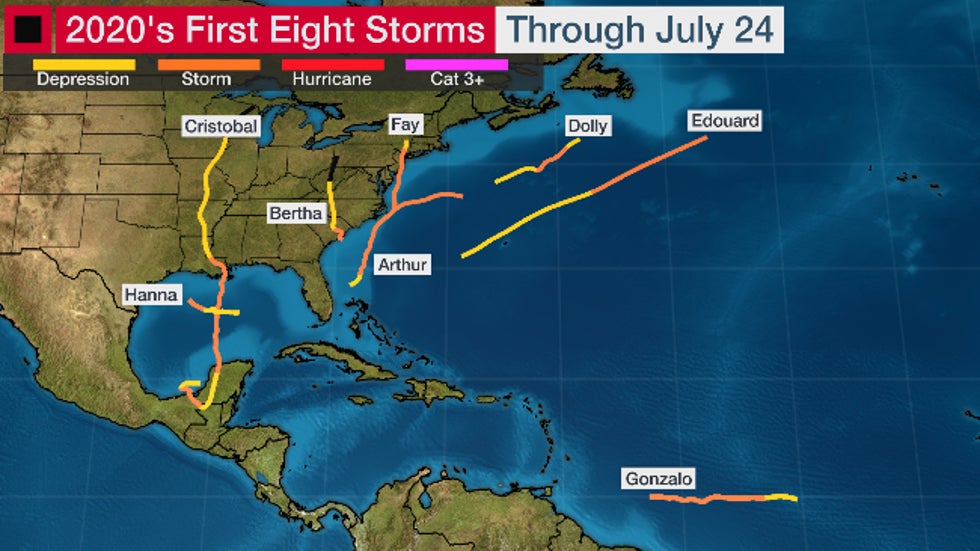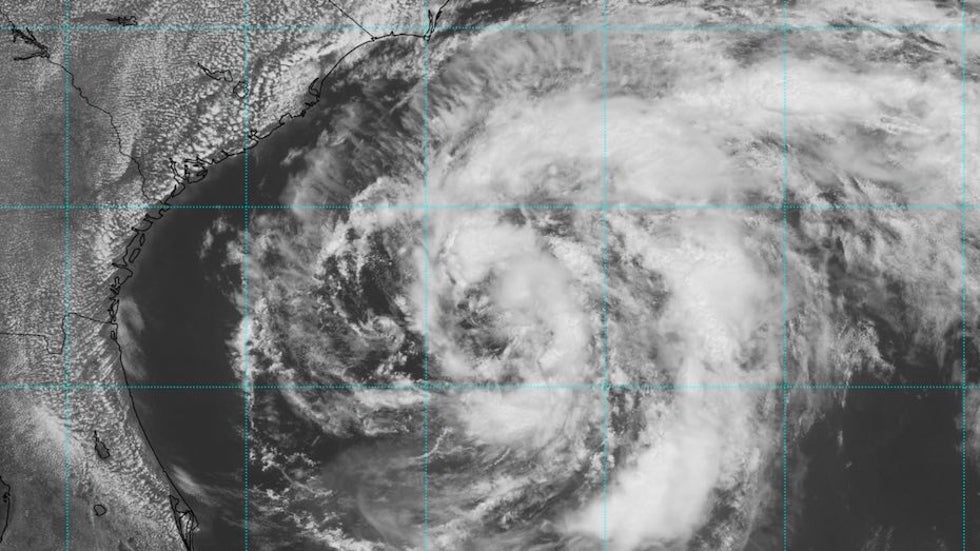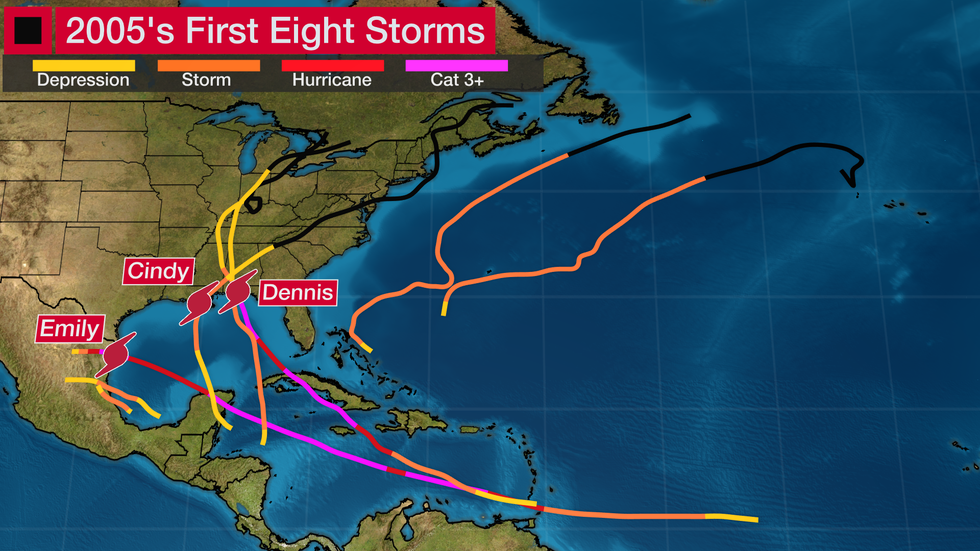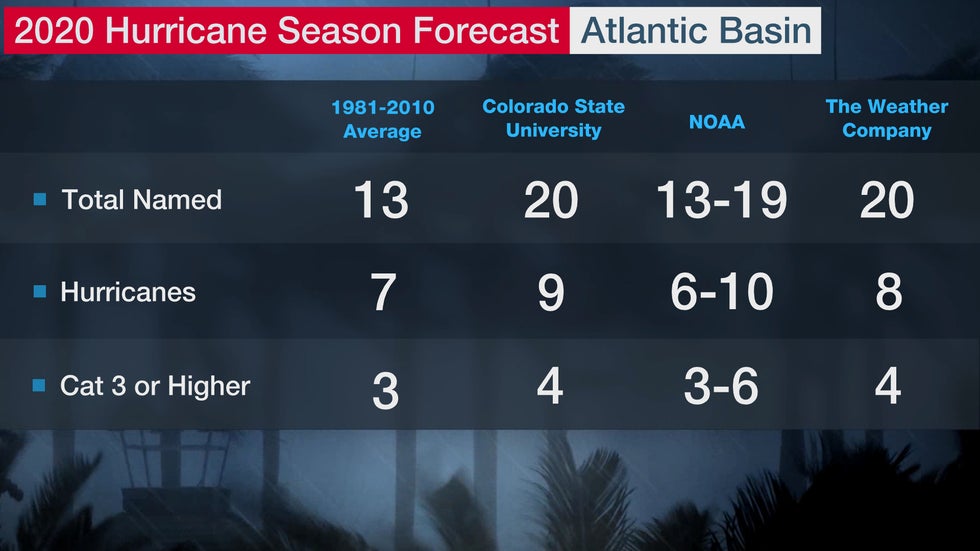 2020 Atlantic hurricane season tracks through July 24.
2020 Atlantic hurricane season tracks through July 24.The 2020 Atlantic hurricane season is already smashing records for the number of named storms so early in the season, but the record 2005 hurricane season was much worse this early in the season, with much higher impact in the U.S. and elsewhere.
There have been eight named storms in the 2020 Atlantic hurricane season through July 24, after Hanna became a tropical storm Thursday.
Hanna became the record-earliest eighth named storm in the Atlantic Basin, 11 days earlier in the calendar than the previous record, according to Colorado State University tropical scientist Phil Klotzbach.
In fact, Cristobal (June 2), Edouard (July 5), Fay (July 9) and Gonzalo (July 22) were each the record-earliest third, fifth, sixth and seventh named storms. We even had two named storms before the season's official June 1 start - Arthur and Bertha - in mid- to late May.
 GOES-East visible satellite image of Tropical Storm Arthur off the Southeast coast on May 17, 2020.
GOES-East visible satellite image of Tropical Storm Arthur off the Southeast coast on May 17, 2020.Previous Record Pace: 2005*
Now, here's the kicker: the previous record-earliest "E," "F", "G" and "H" storms in the Atlantic Basin all occurred in the 2005 Atlantic hurricane season.
That was the most extreme hurricane season in the modern era, with a record 28 storms, 15 of which were hurricanes. It was a season with the nation's costliest hurricane (Katrina), the most intense Atlantic hurricane (Wilma) and another $25 billion hurricane (Rita).
(MORE: The Record-Breaking 2005 Hurricane Season, By the Numbers)
Sounds unsettling, right?
We're ahead of the storm pace from the most extreme hurricane season in recent memory. We're already as far down the name list as late-September in an average hurricane season, according to the National Hurricane Center.
2005 Started Out Much Worse
Before we begin declaring this will be 2005 déjà vu, there's a key point about the first couple of months of that season – the 2005 season started out much worse than 2020.
Three hurricanes were among the first eight named storms of the 2005 season.
 The first eight named storms of the record 2005 Atlantic hurricane season included three hurricanes, two of which made U.S. landfall.
The first eight named storms of the record 2005 Atlantic hurricane season included three hurricanes, two of which made U.S. landfall.Two of those hurricanes – Cindy and Dennis – made landfalls along the U.S. Gulf Coast.
Dennis did so at Category 3 intensity and was a $3 billion hurricane, in addition to the damage it inflicted in Cuba and Jamaica.
And two of these three hurricanes were particularly intense for so early in the season.
Dennis peaked at Category 4 intensity twice while it was between Cuba and Jamaica on July 7 and 8, then again in the Gulf of Mexico before its July 10 U.S. landfall.
Dennis was immediately topped by Emily, which briefly reached Category 5 strength southwest of Jamaica on July 16, the record-earliest and only known July Category 5 hurricane in the Atlantic Basin. Emily later plowed into Mexico's Yucatan Peninsula, then Northeast Mexico's Gulf Coast at weaker intensity.
One could make an argument each of those hurricanes were among the most forgotten hurricanes of recent history, given what happened later in the 2005 season.
Fortunately, we haven't seen anything like this in 2020 so far.
Using a measure called the ACE index – short for Accumulated Cyclone Energy – which takes into account not just the number, but also the intensity and longevity of storms and hurricanes, 2020's start pales in comparison to 2005, as pointed out by Klotzbach after Gonzalo was named on July 22.
In fact, 2020's mainly short-lived tropical storms place it only slightly above the season-to-date average ACE index.
Going Greek?
That's not to say this season isn't expected to be active.
Seasonal forecasts from Colorado State University, NOAA, and The Weather Company, an IBM Business, expect the 2020 season to be more active than average, due to various factors such as a lack of an El Niño and warmer-than-average Atlantic Ocean water.
 2020 Atlantic hurricane season outlooks as of mid-July 2020, compared to an average season.
2020 Atlantic hurricane season outlooks as of mid-July 2020, compared to an average season.And one or more of those hurricanes could bring a punishing blow somewhere in the Atlantic Basin, something that's happened even in less active hurricane seasons.
With two of those forecasts aiming for 20 named storms, that puts a rare possibility on the table – running out of storm names.
If there is another storm after the 21st named storm this season – Wilfred – the next names would come sequentially from the Greek alphabet, starting with Alpha.
That only happened once before, in 2005, after record-setting Hurricane Wilma.
The 2005 season didn't end with Alpha – it went six names deep into the Greek alphabet. The last storm of the season, Zeta, formed two days before New Year's Eve and didn't fizzle until Jan. 7.
Two of those Greek storms – Beta and Epsilon – became hurricanes. Beta plowed into Nicaragua at Category 2 strength the day before Halloween.
 The National Hurricane Center's big board showing the list of Atlantic named storms as of late 2005.
The National Hurricane Center's big board showing the list of Atlantic named storms as of late 2005.It's yet another reason the 2005 season is firmly on the Mount Rushmore of hurricane seasons.
The Weather Company’s primary journalistic mission is to report on breaking weather news, the environment and the importance of science to our lives. This story does not necessarily represent the position of our parent company, IBM.
The Weather Company’s primary journalistic mission is to report on breaking weather news, the environment and the importance of science to our lives. This story does not necessarily represent the position of our parent company, IBM.

No comments:
Post a Comment